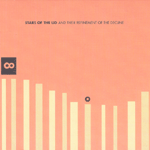Stars of the Lid, "And Their Refinement of the Decline"
 "Dungtitled (in A major)" seems an irreverent title, but announces sonically Brian McBride's and Adam Wiltzie's most doggedly serious recording to date. Compared to The Tired Sounds of... the music on And Their Refinement of the Decline is more direct, relying less on minutiae and emphasizing the power of their music as cleansing and consumptive.
"Dungtitled (in A major)" seems an irreverent title, but announces sonically Brian McBride's and Adam Wiltzie's most doggedly serious recording to date. Compared to The Tired Sounds of... the music on And Their Refinement of the Decline is more direct, relying less on minutiae and emphasizing the power of their music as cleansing and consumptive.
Kranky
Stars of the Lid have not changed their approach radically. Their music is the same patient and haunting event it has been since Music for Nitrous Oxide was released over ten years ago. It would be tempting to say their music has become more sophisticated or careful, but neither seems absolutely true in the sense that the band has stayed true to an ambiguous ethos marked by careful progression and an emphasis on the subtle. If anything, they have provided different perspectives on the same idea, continually extracting new sounds and points of view from that constant and familiar ethos. With that in mind Stars of the Lid begin their new record on an austere note, the tone of the record sounding immediately funeral. The timbre of their chosen instruments is wooden and deeply resonant, sounding like the announcement of some grave event. The mood doesn't last long, however, as the music evolves into a less severe progression of long, almost royal horn performances and keyboard drones. It's as though the band is passing from the atmospheric tendencies and dark themes of past albums and into new territory, but without eschewing that important facet of their tenor. More simply, Stars of the Lid appear to be thinking about their own sound more than ever and, instead of radical change, they've opted to shift the focus of their music as carefully and slowly as the chords of their songs change over time.
Typically the music could be called meditative: the effect their music elicits is calming and often hypnotic. To focus on that aspect disproportionately would deny the immediacy and power of their slowly and softly evolving sounds, though, and would miss part of what makes the music so beautiful. In turns the songs on this album ask the listener to either relax and be submerged into the loud, deep tones of the horns, strings, and voices or to sit up and pay attention. In the latter case it isn't so much that the music asks anything, it outright demands and urges an immediate response, as on "Articulate Silences Part 2." The development of the song lends itself to the shock of introduction, of unexpected new qualities. I know Stars of the Lid are often referred to as soporific, but casual listening to this record does not stay casual for long. Even as many of the arrangements develop in simple wave-like forms, the addition or subtraction of elements in each waves reveals new layers that further the involvement of the audience. This has, to some extent, always been true of their music: it never seems entirely appropriate to treat their music passively. This record seems more firm, however, more wholly unified in its purpose and performance.
The first disc ends with a song called "A Meaningful Moment Through A Meaning(Less) Process." After nearly one hour of music, this particular piece comes as a surprise both in title and in essence. The piano that leads the song into its brief duration stands out among the various solo instruments that populate the first disc. It is bright, repetitive, obviously treated, and absolutely distinct from the other aspects of the song. The emotional impact it leaves is stupendous, which brings me to the title itself. I'm not sure how reflective it is supposed to be of the band or the way they think of their music; after all, they have included a piece called "That Finger On Your Temple Is the Barrel of My Raygun" on this album, on the same disc that ends with "December Hunting for Vegetarian Fuckface." The title speaks to something concerning this band's music that goes beyond the silliness they might've afforded themselves with names this time around. Stars of the Lid tug at the heart strings more so than they stimulate some academic approach to minimal music or experimental composition. Each note, each aspect of their music from the kinds of instruments they use to the decisions they make concerning arrangement and mixing, somehow draws powerful responses out of me, though any of the single notes they produce or even whole phrases alone do not necessarily lead me beyond those very notes, seemingly empty of content. Their talent for drawing human qualities of what might be termed essentially un-human processes is impressive, both for its impact and for the consistency of that fact. That spilling over of emotional content requires the listener, though: this is not background music, it's far more exciting than that.
samples:
- Articulate Silences Part 2
- Dopamine Clouds Over Craven Cottage
- That Finger On Your Temple Is the Barrel of My Raygun



